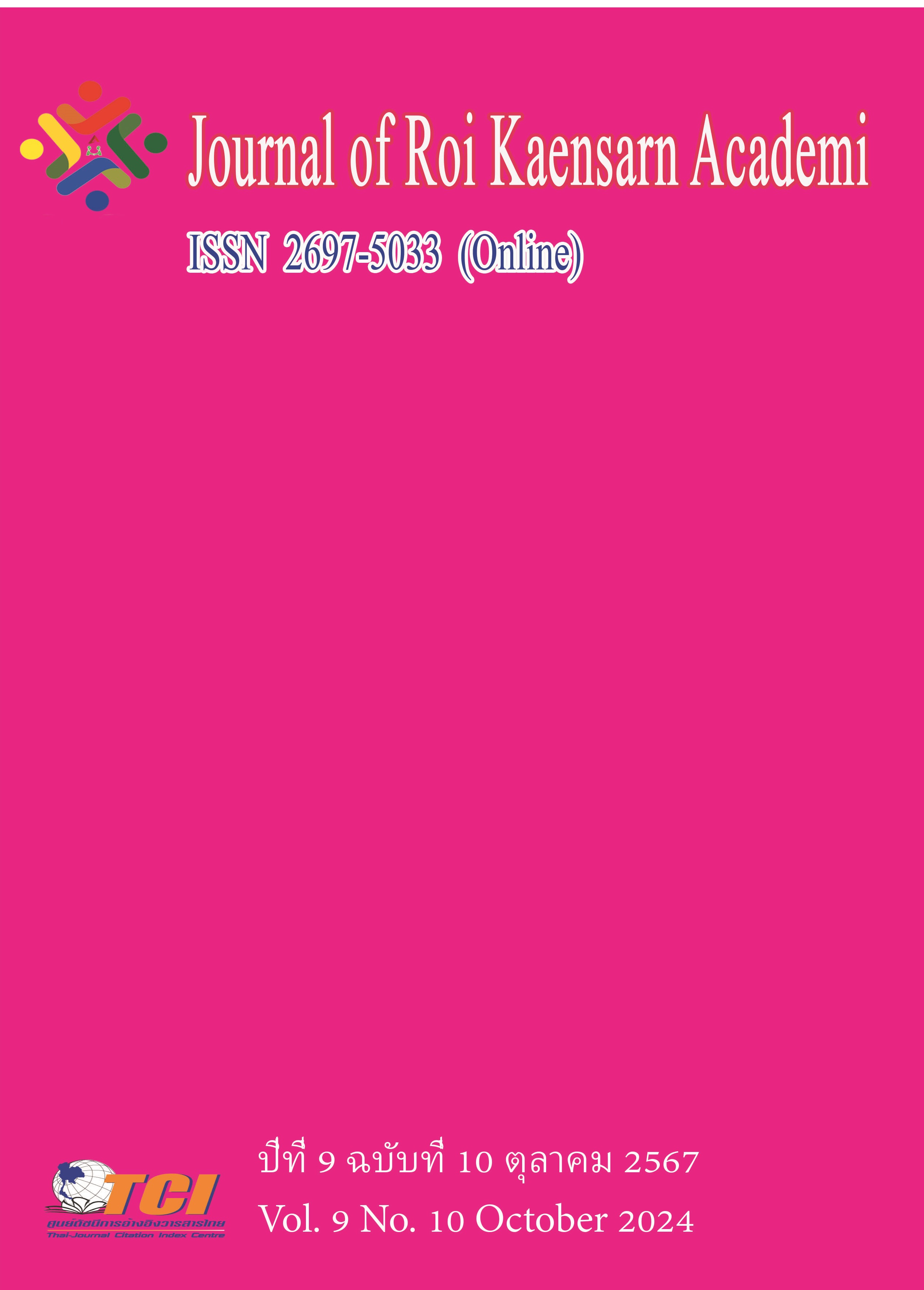Cultural Identities and Tourism Appeal of Chaoshan Culinary Arts
Main Article Content
บทคัดย่อ
This study explores the cultural characteristics and tourism appeal of Chaoshan cuisine, focusing on the distinctive culinary identifiers and techniques that contribute to the development of cultural tourism in the region. The main objectives were to identify key cultural elements that enhance Chaoshan cuisine's attractiveness to tourists and examine the role of these culinary features in creating meaningful artistic experiences.
A mixed-method approach was adopted, combining structured field observations and quantitative surveys to comprehensively assess tourists' perceptions and motivations regarding Chaoshan culinary experiences. Research was conducted at popular restaurants in Shantou and Chaozhou, focusing on visual appeal, renowned dining atmospheres, and service quality. A total of 303 survey responses were collected, supplemented by systematic observations at selected sites. Results indicated that visual aesthetics and high-quality service significantly increase tourist engagement, while culinary narratives deepen cultural immersion.
Practical recommendations for destination managers include integrating traditional culinary elements into immersive experiences and promoting regional cooperation to achieve sustainable tourism. The findings suggest that preserving and promoting these culinary features not only supports local economic growth but also strengthens Chaoshan's cultural identity as a premier culinary tourism destination. Furthermore, the study highlights the importance of memorable culinary experiences in enhancing the overall tourist experience, offering valuable insights for policymakers and stakeholders on incorporating culinary heritage into sustainable tourism development.
Article Details
เอกสารอ้างอิง
Anton Martin, C., Camarero Izquierdo, C., & Laguna-Garcia, M. (2021). Culinary tourism experiences: the effect of iconic food on tourist intentions. Tourism Management Perspectives, 40, 100911.
Chen, H., Huang, J., Wu, J., Wang, G., Lv, C., Wang, Y., & Liu, Y. (2023, October 1). Construction of chaoshan cuisine culture space. | journal of landscape research | EBSCOhost.
Dalton, S. (2020). Disrupting culinary education: making a case for a european curriculum framework for culinary higher education. Dublin Gastronomy Symposium.
Daries, N., Marine-Roig, E., Ferrer-Rosell, B., & Cristobal-Fransi, E. (2021). Do high-quality restaurants act as pull factors to a tourist destination? Tourism Analysis, 26 (2–3), 195–210.
Demir, M., & Dalgıç, A. (2022). Examining gastronomy festivals as the attractiveness factor for tourism destinations: the case of Turkey. Journal of Convention & Event Tourism, 23 (5), 412–434.
Di-Clemente, E., Hernández-Mogollón, J. M., & López-Guzmán, T. (2020). Culinary tourism as an effective strategy for a profitable cooperation between agriculture and tourism. Social Sciences, 9 (3), 25.
Galati, A., Testa, R., Schifani, G., & Migliore, G. (2023). Tourists’ motivation toward culinary destination choice: targeting italian tourists. Journal of Foodservice Business Research, 26 (4), 647–668.
Huang, M., & Hemchua, S. (2023). The application of chaozhou intangible cultural heritage symbols in cultural creative industry. Journal of Survey in Fisheries Sciences, 10(2S), 3045–3053.
Khairi, M., & Darmawan, D. (2021). The relationship between destination attractiveness, location, tourism facilities, and revisit intentions. Journal of Marketing and Business Research (MARK), 1 (1), 39–50.
Koufadakis, S. X., & Manola, M. (2020). The gastronomy as an art and its role in the local economic development of a tourism destination: a literature review. SPOUDAI Journal of Economics and Business, 70 (1–2), 81–92.
Lee, K.-S. (2022). Culinary aesthetics: world-traveling with culinary arts. Annals Of Tourism Research, 97, 103487.
Liberato, P., Mendes, T., & Liberato, D. (2020). Culinary tourism and food trends. In Á. Rocha, A. Abreu, J. V. de Carvalho, D. Liberato, E. A. González, & P. Liberato (Eds.), Advances in Tourism, Technology and Smart Systems (pp. 517–526). Springer.
Park, E., & Widyanta, A. (2022). Food tourism experience and changing destination foodscape: an exploratory study of an emerging food destination. Tourism Management Perspectives, 42, 100964.
Putra, A. R., Ernawati, E., Jahroni, J., Anjanarko, T. S., & Retnowati, E. (2022). Creative economy development efforts in culinary business. Journal of Social Science Studies (JOS3), 2 (1), 21–26.
Rajasinghe, D., Aluthgama-Baduge, C., & Mulholland, G. (2021). Researching entrepreneurship: an approach to develop subjective understanding. International Journal of Entrepreneurial Behavior & Research, 27 (4), 866–883.
Rousta, A., & Jamshidi, D. (2020). Food tourism value: investigating the factors that influence tourists to revisit. Journal of Vacation Marketing, 26 (1), 73–95.
Shen, S., Sotiriadis, M., & Zhang, Y. (2020). The influence of smart technologies on customer journey in tourist attractions within the smart tourism management framework. Sustainability, 12 (10), 4157.
Sinambela, E. A. (2021). Examining the relationship between tourist motivation, touristic attractiveness, and revisit intention. Journal of Social Science Studies (JOS3), 1 (1), 25–30.
Stone, M. J., Migacz, S., & Sthapit, E. (2022). Connections between culinary tourism experiences and memory. Journal of Hospitality & Tourism Research, 46 (4), 797–807.
Suhartanto, D., Brien, A., Primiana, I., Wibisono, N., & Triyuni, N. N. (2020). Tourist loyalty in creative tourism: the role of experience quality, value, satisfaction, and motivation. Current Issues in Tourism, 23 (7), 867–879.
Ueda, H., & Poulain, J.-P. (2021). What is gastronomy for the french? An empirical study on the representation and eating model in contemporary france. International Journal of Gastronomy and Food Science, 25, 100377.
van Nuenen, T., & Scarles, C. (2021). Advancements in technology and digital media in tourism. Tourist Studies, 21 (1), 119–132.
Vujičić, M. D., Kennell, J., Morrison, A., Filimonau, V., Štajner Papuga, I., Stankov, U., & Vasiljević, D. A. (2020). Fuzzy modelling of tourist motivation: an age-related model for sustainable, multi-attraction, urban destinations. Sustainability, 12 (20), 8698.
Vuksanović, N., Demirović Bajrami, D., Petrović, M. D., Radovanović, M. M., Malinović-Milićević, S., Radosavac, A., … Ergović Ravančić, M. (2024). The role of culinary tourism in local marketplace business—new outlook in the selected developing area. Agriculture, 14 (1), 130.
Zainal Abidin, M. R., Che Ishak, F. A., Ismail, I. A., & Juhari, N. H. (2020). Modern malaysian cuisine: identity, culture, or modern-day fad? International Journal of Gastronomy and Food Science, 21, 100220.
Туракуловна, Х. М. (2024). The link between france gastronomy and ttourism. Modern Education and Development, 2 (2), 146–152.

